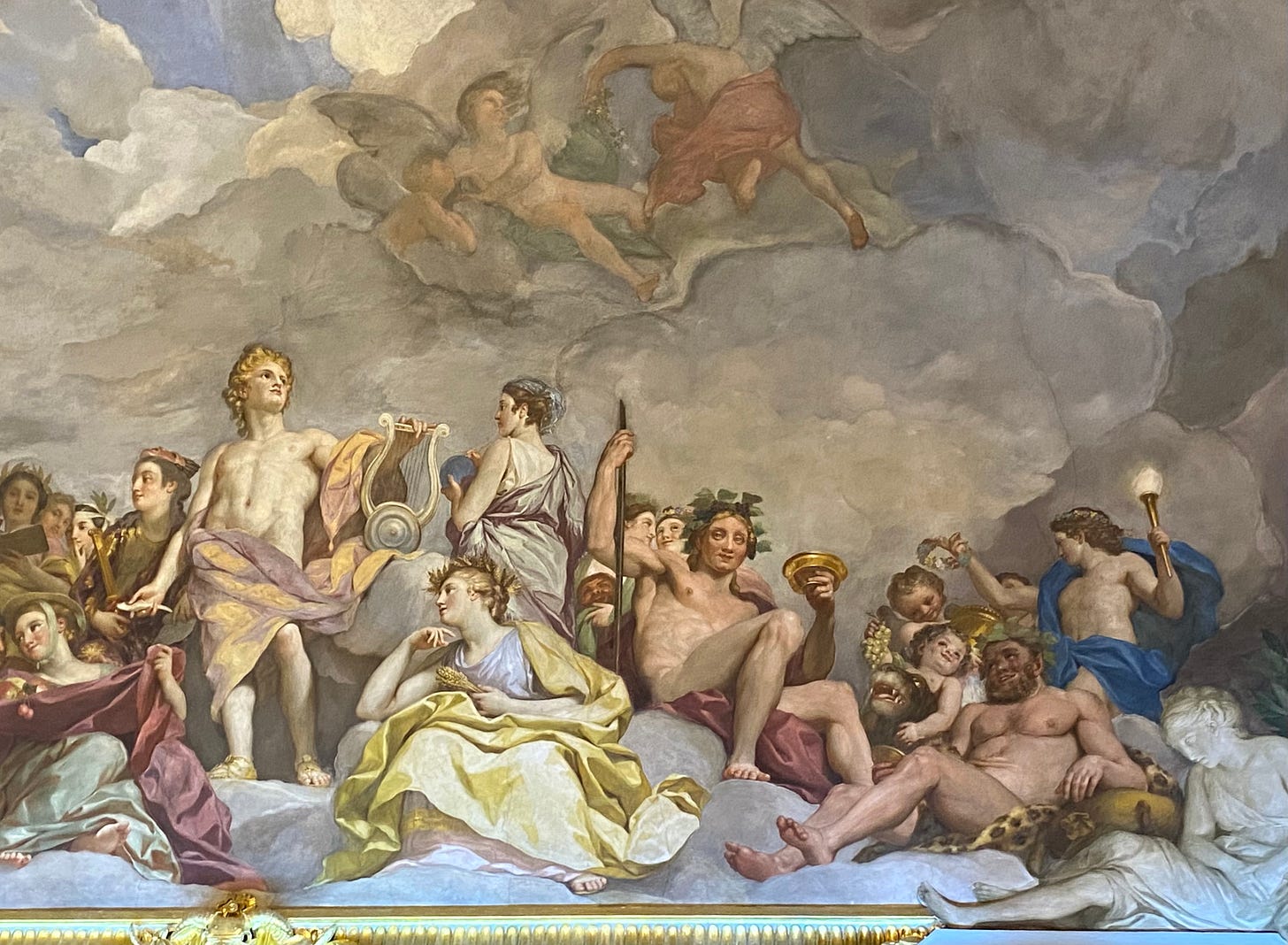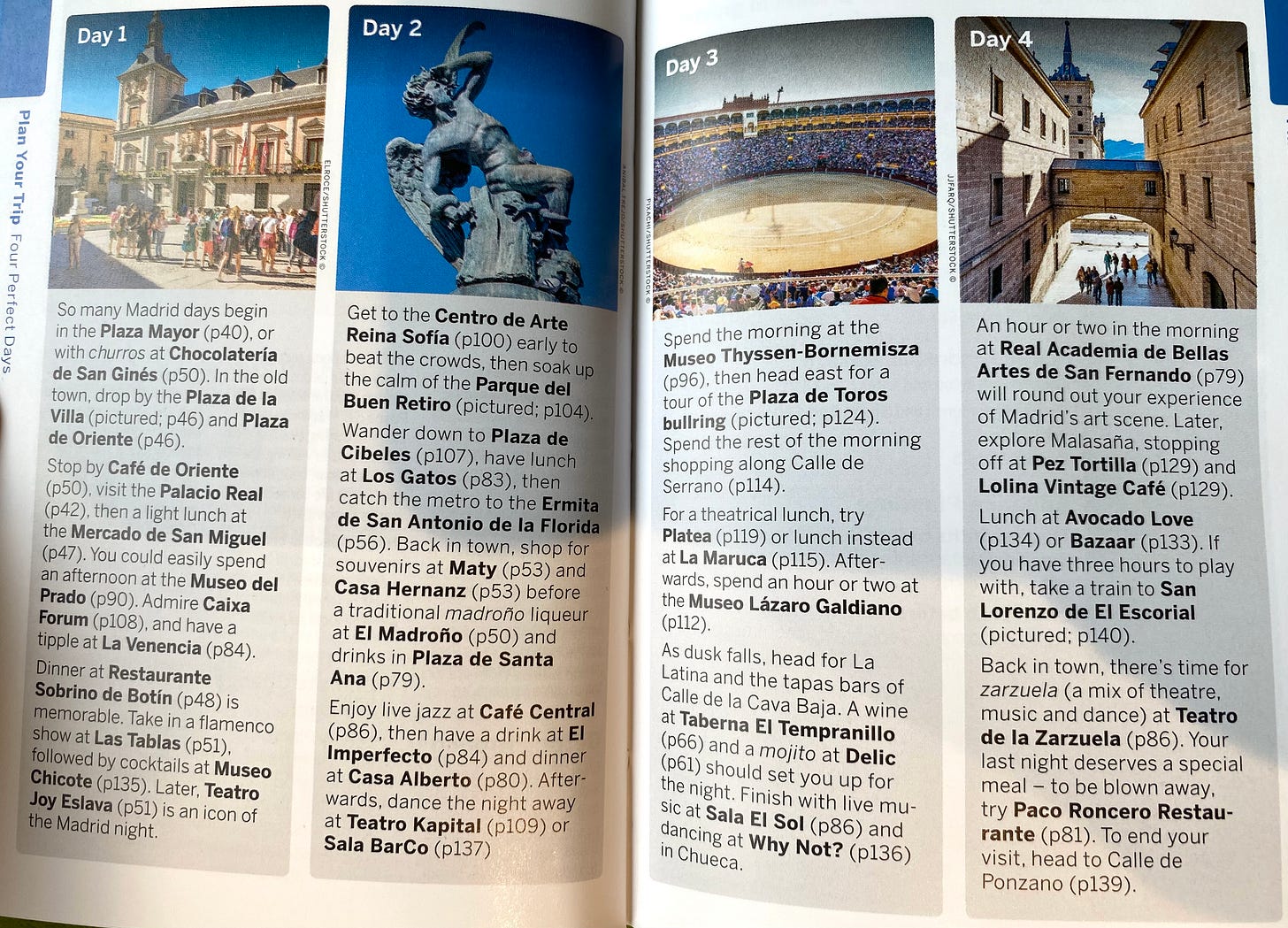Let other travelers bask in the sun, relax, and wine and dine. While visiting Madrid recently, I fulfilled my duty as the Happy Wanderer by researching and planning this essay, as well as next week’s, The Subject Is the Dog (which is actually about Spanish art). Ready? Vámonos!
Tourists Are Not Locals, and That’s OK
I am a morning lark who always wakes at the crack of dawn. This is both a blessing and a curse. It’s a blessing to get to popular sights first thing and enjoy them unobstructed by the massive crowds that descend later.

But early rising is a curse when you’re in a night-owl country like Spain. Spanish mealtimes—typically around 9pm for dinner and 2pm for lunch—are challenging for us morning larks, to say the least. As Nate Bargatze puts it, “If you get up at 5:45am, noon is pretty far away though. You bet your life it’s noon and it’s maybe 8:30. 6pm, you’re like, ‘I don’t know how people are OUT!’” Exactly. Instead of pretending I was a true Madrileño, and suffering from the resulting sleep-deprivation, I compromised: On our first night, we had dinner on Madrid time. We checked out the lively scene and strolled back to the hotel around 10:30pm. But for the remainder of the week, I either skipped dinner or had some tapas at my regular time and then called it a day.
Guidebooks will urge us to “become a local” while traveling, but it’s perfectly fine not to. The locals can tell we’re tourists, after all; it’s not like we’re fooling them. If an aspect of local culture doesn’t make sense for us, we shouldn’t feel obligated to participate. Whether we are an early riser who is not tempted by late dinners, or a sober traveler who is reluctant to join in with British pub culture, or a religious person who prefers not to tour Amsterdam’s red-light district—or, heck, a Bostonian visiting New York who refuses to root for the Yankees—for all of us, and for whatever reason, it’s ok to heed Polonius’s advice and “to our own selves be true.”
Less Is More
My kids have been known to complain about my fondness for making them trudge through every dang cathedral and every dang museum on our trips. They will be surprised to hear that on this trip I planned less—and enjoyed myself more.
Which is not as easy as it sounds. I had to ingore the siren song of our guidebooks, which offered hundreds of ideas for how to fill every moment. See, for example, this spread from the Lonely Planet guide to Madrid:
I get that Lonely Planet guides are aimed at a younger audience, but even so, their plan for “four perfect days” is nuts. On day one, they suggest visiting the largest palace in Europe and then, all the way across town, one of the largest museums in the world, followed by another nearby museum. In between, they recommend “dropping by” a market, two cafés, and three plazas. We’re supposed to cap the day off with dinner, followed by a flamenco show and barhopping. I’m exhausted just reading about it. Do the good folks at Lonely Planet think we can teleport? Or that we will shove our way to the front of every line?1 Will we need another vacation to recover from our vacation?
Rant over. My point is that travel aficionados, be they writers of guidebooks, online influencers, or super-energetic people, will encourage us to cram in as much as possible, leaving no time for the relaxation and reflection most of us require to truly appreciate our experiences. Quietly sipping a cool drink on a warm afternoon is a valid travel activity too!

History Helps Us Be Happy
Readers may be familiar with complaints from some corners of the internet that we live in a “capitalist hellscape.” But as anyone who has even a nodding aquaintance with history knows, doomerism is just plain ignorant. Think, for example, of Madrid’s Plaza Mayor during the Inquisition. As Rick Steves informs us, horrendous atrocities were committed there:
Suspected heretics, Protestants, Jews, and Muslims whose “conversion” to Christianity was dubious. . . . were paraded around the square before their executions, wearing placards listing their many sins. . . . The heretics were burned, and later, criminals were slowly strangled as they held a crucifix. . . . Up to 50,000 people could crowd into this square for such spectacles.2
Now compare Plaza Mayor today. Thousands of people from all nations, ages, races, religions, and classes come together in peace to take in the scene, walk their dogs, learn some history, hang out with friends, and soak up the sun—with nary a torture victim in sight. Quite an improvement, don’t you think?
Then there’s Goya’s royal portrait of the family of Carlos IV, which hangs in the Prado. I don’t mean to be ageist, but yikes. The queen, Maria Luisa of Parma, was in her late forties when Goya painted her, but to our modern eyes she looks much older, and also really unhappy.

Poor dear. It’s no wonder she looks like she was rode all day and put away wet: She was pregnant twenty-three times, and the pregnancies absorbed so much calcium from her body that she had lost all her teeth by the time she was in her thirties. She gave birth to thirteen children, only seven of whom survived into adulthood (and one, Maria Amalia, barely made it; she died from complications of childbirth at age nineteen). And this was one of the richest and most powerful people in the world. Imagine how much worse it was for ordinary people. A bit of historical perspective makes it clear that even given capitalism, climate change, and Covid, the best possible time to live is right now.
He Had a Hat
I have written before about one of my favorite Zen stories. A farmer’s horse runs away. “Such bad luck!” say the neighbors. “Maybe,” says the farmer. The next day the horse comes back and has brought two wild horses with him. “Such good luck!” say the neighbors. “Maybe,” says the farmer. The moral of the story is that we can’t control our luck, but we can control our reaction to it.
Apropos this point, the entire week we were in Madrid, the sanitation workers were on vacation. Which meant that every sidewalk in the city was obstructed by oozing, odoriferous heaps of trash that accumulated as the week went on. On the way to the airport to fly home, I looked out the cab’s window and had to laugh. The sanitation workers had apparently come back to work in the middle of the night, because all the trash was gone—just in time for us to miss out on clean streets. Such bad luck! Maybe. But then again, there was that massive power outage in Spain and Portugal last week, and we got out half an hour before the blackout hit. Such good luck! Maybe.
We’re happier when we’re able to accept our luck, whether good or bad, with equanimity and a sense of humor—as my mother-in-law, Louise,3 did when she discovered that she had lost her favorite hat somewhere inside a magnificent (and massive) cathedral. Instead of getting upset, Louise started laughing. “He had a hat!” she said, referencing this joke:
A grandma is at the beach with her grandson, watching fondly as he builds a sand castle. Suddenly a huge wave crashes ashore and sweeps the little boy out to sea. The grandma cries to the heavens, “Lord, take me, take everything I have, but please, please bring my grandson back!” And just as suddenly, the wave comes back and sets the totally unharmed little boy gently back down on the beach. The wave even rebuilds the sand castle, and the boy resumes playing contentedly, as though nothing had ever happened.
The grandma looks to the heavens and again calls out, “Oh thank you, Lord! . . . but . . . he had a hat.”
We laugh, because we recognize ourselves in the grandma. It is only human to bemoan petty problems, but the joke reminds us to be grateful for the many blessings in our lives.
How about you, readers? What lessons have you learned on your travels? Do you prefer to become like a local, or to be true to thine own self? Please share your thoughts in the comments!
The Tidbit
Spanish cuisine, reliant as it is on ham and seafood, is not known for being vegetarian-friendly.
But there is actually lots for us vegetarians to enjoy: Dry white wine, refreshing beer, tangy olives, crusty bread, tender potatoes, aged cheese, and—best of all—Spanish omelettes. I started every day with a robust slice of Spanish omelette, which sustained me all the way to the mid-afternoon lunchtime.
I call my recipe “french fry omelette” to tempt kids. With a salad, it makes a light family dinner. You can serve the omelette hot or at room temperature, and the leftovers make a filling snack on a hike.
French Fry Omelette
Ingredients
1/4c olive oil
1 small onion, finely diced
a bit of salt
3–4 small potatoes (I use celtiane), peels on, very thinly sliced
5–6 eggs, beaten
about 1/4c mixed chopped fresh herbs, for example Italian flat-leaf parsely, dill, thyme, or oregano
salt and pepper
Method
In a large nonstick pan, heat the olive oil and sauté the onion over medium-low heat, sprinkling with a bit of salt, for about 10 minutes, stirring occasionally.
Place the sliced potatoes on top of the onions, sprinkle more salt over, and toss with a spatula to coat the potatoes in oil. Turn down the heat and cover the pan. Cook about 15 minutes, occasionally tossing the potatoes so that they cook through.
Dump the whole mess into a large bowl and then pour the excess oil back into the pan.
When the potatoes have cooled slightly, pour in the eggs and herbs and mix. Add salt and pepper to taste.
Return the pan to medium heat and pour the omelette back in. Cook on one side, squidging the mixture toward the center to make it thicker. Flip the omelette onto a plate and then flip it back into the pan to cook the other side. Continue to squidge. Do the back-and-forth flip maneuver a couple more times until the omelette is cooked through and is a light golden-brown.
Turn the omelette onto a plate and cut in quarters to serve.
I am sorry to report that no matter what you do, there is always a line. Even if you book in advance, you have to wait in line to exchange your voucher for a ticket.
Rick Steves, Snapshot Madrid and Toledo (Berkeley: Avalon Travel, 2022), p. 25.








A quick late comment! Yes to pleasure when traveling rather than to-do lists. I struggle with all the things we “should” see and do and instead try to focus on what I believe I will most enjoy.
Hi Mari, Hello to a fellow traveller from last year's W & P. I only just now got around to reading this piece, which I so enjoyed. I was in Spain in 1964 and well remember the late eating hours. I'm sure I went to a concert one night and had dinner *after* the concert. Worse still, I suddenly, and unexpectedly, got my period in Toledo; Toledo was in lockdown, the streets were empty - it was siesta time! A somewhat messy memory. Best wishes to you ❤️